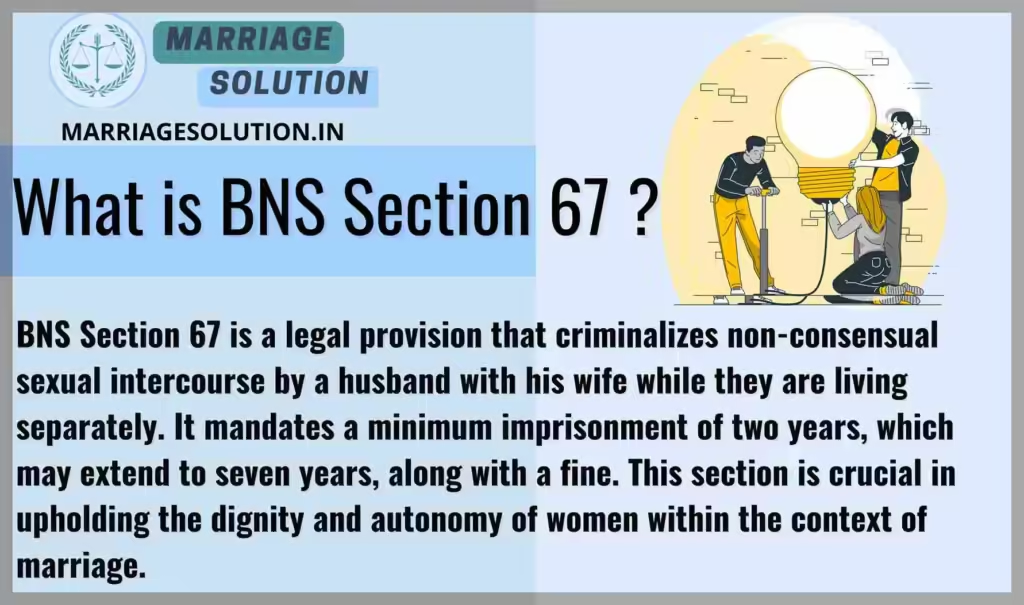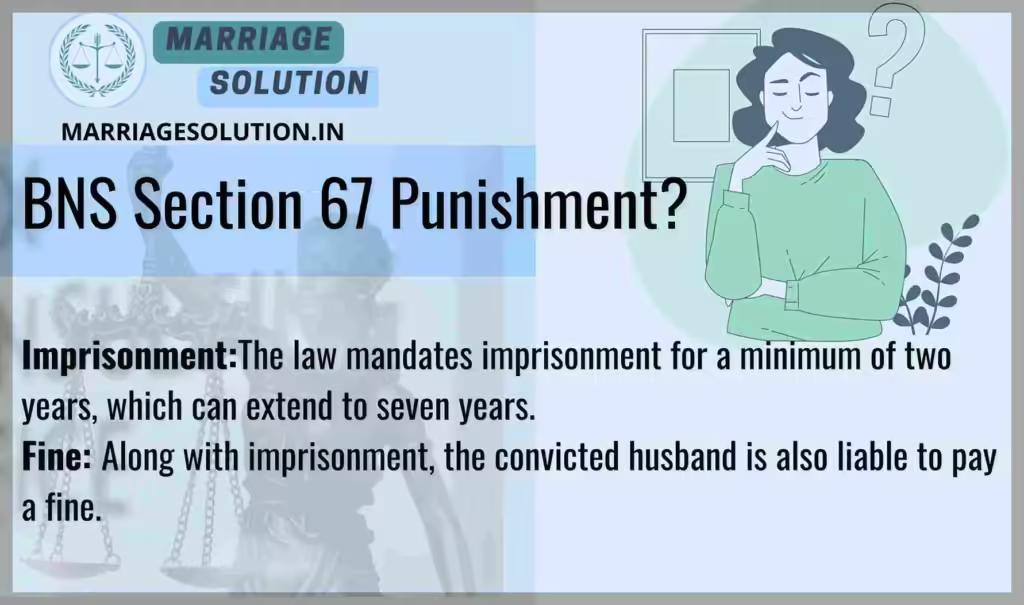Introduction of BNS 67
BNS 67 is a legal provision that addresses the issue of non-consensual sexual intercourse by a husband with his wife during a period of separation. It emphasizes the importance of consent within marriage, particularly when the couple is living separately. This section ensures that even within the marital relationship, a woman’s autonomy and dignity are protected.
The Bharatiya Nyaya Sanhita (BNS) Section 67 replaces the old Indian Penal Code (IPC) Section 376B .
- Introduction of BNS 67
- What is section 67 of BNS ?
- BNS Section 67 in Simple Points
- Section 67 BNS Overview
- BNS 67 Punishment
- BNS 67 bailable or not ?
- Bharatiya Nyaya Sanhita Section 67
- BNS Section 67 FAQs
- If you need support with court proceedings or any other legal matters, don’t hesitate to reach out for assistance.
What is section 67 of BNS ?
BNS Section 67 is a legal provision that criminalizes non-consensual sexual intercourse by a husband with his wife while they are living separately. It mandates a minimum imprisonment of two years, which may extend to seven years, along with a fine. This section is crucial in upholding the dignity and autonomy of women within the context of marriage.

BNS Section 67 in Simple Points
BNS Section 67 criminalizes non-consensual sexual intercourse by a husband with his wife during a period of separation, or by a person in a position of authority. It emphasizes that even within marriage or authority-based relationships, consent is essential.
(This provision corresponds to IPC Section 376B, updated under the Bharatiya Nyaya Sanhita (BNS), 2023.)
1. Meaning of Section 67
BNS Section 67 makes it an offence if:
- A husband, while living separately from his wife (due to judicial separation, mutual agreement, or other legal reasons), has sexual intercourse with her without consent.
- A person in authority (such as a guardian, caretaker, or someone in a position of trust) engages in sexual intercourse without consent.
The section clearly recognizes that separation or authority does not give the right to force sexual relations.
2. Purpose of Section 67
The main aim of this section is to:
- Protect the dignity, autonomy, and bodily rights of women even within marriage or dependent relationships.
- Recognize consent as a legal requirement in intimate relations, irrespective of marital status.
- Criminalize situations where power imbalance (such as authority or guardianship) is misused for sexual exploitation.
3. Essential Ingredients of Section 67
For this section to apply, these conditions must be present:
- Existence of separation: Husband and wife must be living apart.
- Lack of consent: The wife did not agree to the intercourse.
- Position of authority: If not a husband, the accused must be in a role of trust or authority over the victim.
- Mens rea (intention): The act must be intentional and without the victim’s free will.
4. Punishment under BNS Section 67
- Imprisonment: Minimum 2 years, extendable up to 7 years.
- Fine: The offender is also liable to pay a fine.
This ensures both custodial punishment and financial accountability.
5. Examples of Section 67 in Action
- Example 1 (Separation case): A husband, legally separated from his wife, forces her into intercourse. This is punishable under Section 67.
- Example 2 (Authority misuse): A guardian exploits his dependent without her consent. This falls under the scope of Section 67.
- Counter-Example: If the wife consents during separation, the act does not fall under this section.
- Counter-Example: If there is no separation, and the marriage is ongoing, this section does not apply (though debate on marital rape is ongoing in broader legal discussions).
6. Importance of Section 67
BNS Section 67 is important because it:
- Recognizes women’s consent within marriage during separation.
- Provides legal protection against abuse of authority or trust.
- Strengthens India’s commitment to women’s rights and bodily autonomy.
- Sends a strong message that forced intimacy is unacceptable in any relationship.
Section 67 BNS Overview
BNS Section 67 is a legal provision that criminalizes non-consensual sexual intercourse by a husband with his wife while they are living separately. It mandates a minimum imprisonment of two years, which may extend to seven years, along with a fine. This section is crucial in upholding the dignity and autonomy of women within the context of marriage.
BNS Section 67 : 10 Key Points
Legal Protection for Women
BNSS Section 67 is designed to ensure that a woman’s right to bodily autonomy and consent remains protected, even within marriage. It applies specifically when the husband and wife are living separately, whether due to judicial separation, mutual agreement, or other legal reasons. The section recognizes that separation creates a legal boundary, and the husband does not have the right to force sexual relations against his wife’s will. This provision strengthens the protection of women within the institution of marriage by making their consent a legal requirement.
Criminalizing Non-Consensual Acts
One of the most significant aspects of this section is that it criminalizes non-consensual sexual intercourse by a husband during separation. Traditionally, marital rape has been excluded from the definition of rape in Indian law, but Section 67 acknowledges that when a couple is legally separated, consent becomes as important as in any other relationship. Thus, forcing sex during separation is not treated as a private matter but as a criminal act punishable under law.
Minimum Punishment
To underline the seriousness of this offence, the law mandates a minimum imprisonment of two years for the convicted husband. This minimum sentence ensures that courts cannot impose a light or symbolic punishment, thereby guaranteeing accountability and justice for the victim.
Extended Punishment
Depending on the severity of the case and the impact on the victim, the punishment can be extended up to seven years of imprisonment. This wider range allows courts to assess the circumstances carefully—considering factors such as the degree of coercion, repeat offences, or the level of harm caused—before deciding the final punishment.
Imposition of Fine
In addition to imprisonment, the convicted husband is also liable to pay a fine. The fine serves as both an additional penalty and a means to provide financial relief or support to the victim, especially considering the physical and emotional trauma caused by the act. It reinforces the seriousness of the offence by combining both imprisonment and monetary consequences.
Cognizable Offense
The offence under Section 67 is classified as cognizable, which means that the police have the authority to register a case and investigate it. However, to protect against misuse and to respect the privacy of the marital relationship, legal proceedings can only be initiated on the complaint of the wife herself. This balances the woman’s right to justice with safeguards against false accusations.
Bailable Offense
Unlike many other sexual offences, this one is categorized as bailable, which means that once a complaint is filed, the accused husband may be released on bail by the court. The reasoning here is that while the offence is serious, it still occurs within the sensitive context of marriage and separation, so the law allows some room for judicial discretion.
Non-Compoundable Offense
The law makes this a non-compoundable offence, meaning that the case cannot be withdrawn or settled privately outside of court. Once a complaint is made, the matter must proceed through the legal system. This ensures that the dignity of the woman is protected and that justice is pursued as a matter of public interest rather than left to private negotiation.
Court of Session Trial
Cases under Section 67 are triable by a Court of Session, which is the higher criminal court in the district. By assigning the case to such a court, the law ensures that these offences are given serious judicial attention, with trials handled by judges experienced in grave criminal matters.
Emphasis on Consent
Perhaps the most important aspect of Section 67 is its emphasis on consent, even within marriage. The section makes it clear that separation does not give the husband a legal or moral right to force sex on his wife. It sends a strong message that consent remains central to marital relations, and women’s rights and dignity must be respected under all circumstances.
BNS 67 Punishment
Imprisonment: The law mandates imprisonment for a minimum of two years, which can extend to seven years.
Fine: Along with imprisonment, the convicted husband is also liable to pay a fine.

BNS 67 bailable or not ?
BNS Section 67 is bailable, meaning the accused can be released on bail, but this is contingent upon the victim filing a complaint.
Bharatiya Nyaya Sanhita Section 67
| Section | Offence | Punishment | Bailable / Non-Bailable | Cognizable / Non-Cognizable | Trial By |
|---|---|---|---|---|---|
| BNS Section 67 | Sexual intercourse by husband upon his wife during separation or by a person in authority, without consent. | Imprisonment not less than 2 years, may extend to 7 years; and fine. | Bailable | Cognizable (only on complaint of the wife) | Court of Session |
| IPC Section 376B (Old) | Sexual intercourse by husband with his wife during separation, without consent. | Imprisonment not less than 2 years, may extend to 7 years; and fine. | Bailable | Cognizable (only on complaint of the wife) | Court of Session |
BNS Section 67 FAQs
What is the minimum punishment under Section 67?
The minimum punishment is two years of imprisonment.
What is the maximum punishment under this section?
The maximum punishment is seven years of imprisonment.
Is a fine imposed along with imprisonment?
Yes, a fine is imposed in addition to imprisonment.
Is the offense bailable?
Yes, the offense is bailable, but only if the victim files a complaint.
Can the case be settled out of court?
No, the offense is non-compoundable, meaning it must be tried in court.
Which court handles cases under Section 67?
The case is triable by a Court of Session.
Conclusion
BNS Section 67 is a landmark provision under the Bharatiya Nyaya Sanhita that ensures women’s consent remains central in marital relationships, especially during separation. By criminalizing non-consensual sexual intercourse by a husband with his wife while living apart, the law reinforces the dignity, safety, and autonomy of women. With strict punishment ranging from 2 to 7 years of imprisonment plus fine, and its cognizable yet bailable nature, this section balances legal accountability with sensitivity to marital circumstances.
By replacing IPC Section 376B, BNS 67 modernizes Indian criminal law, sending a strong message that consent cannot be ignored—even within marriage. It highlights that separation creates a legal boundary where forcing sexual relations becomes a punishable offence. This law is an important step in protecting women’s rights, strengthening marital justice, and ensuring that personal dignity is safeguarded under all circumstances.
Need Legal Support?
If you are dealing with court cases, marriage problems, or any other legal issue, our team at Marriage Solution – Lawyer Help is here for you. Simply fill out our quick online enquiry form, and we’ll connect you with the right legal expert to support your needs.
Finished with BNS 67 ? Continue exploring the next provisions of the Bharatiya Nyaya Sanhita (BNS), 2023. Each section includes explanations, examples, and plain-language breakdowns for easy understanding.
- BNS Section 68 : Sexual intercourse by a person in authority.
- https://marriagesolution.in/bns_section/bns-68/
- BNS Section 69 : Sexual intercourse by a person in authority.
- https://marriagesolution.in/bns_section/section-69-bns/
- BNS Section 70 : Gang rape .
- https://marriagesolution.in/bns_section/bns-70/
- BNS Section 71 : Punishment for repeat offenders .
- https://marriagesolution.in/bns_section/bns-71/
- BNS Section 72 : Disclosure of identity of the victim of certain offences, etc .
Full IPC Section List: https://marriagesolution.in/ipc-section-list
All Indian Law & Blogs: https://marriagesolution.in/indian-law/
Full BNSS Section List: https://marriagesolution.in/bnss_section-list
